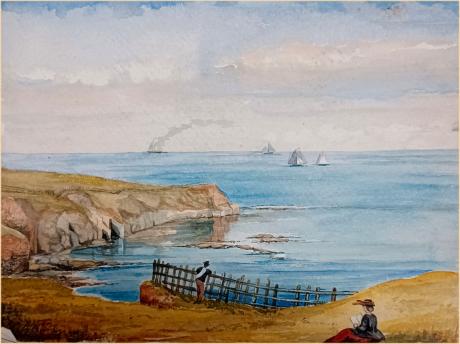signed inscribed and dated
The Magdalene Fields was name after a Benedictine nunnery which was said to have been founded by David, King of Scotland, the monasteries of Black, Grey, White, and Trinitarian friars, and three or four hospitals, have entirely disappeared. The Magdalen fields, belonged to the Hospital of St. Mary Magdalen.
The fields were originally taken over from the Duke of Northumberland with special instructions that they were for the good of the town. The 18 hole Golf Course was created in 1903 in the spirit- for the good of the town. The fields were originally pasture for cows and in the mid 19th Century the fields were used for liesure and walking. In the 1850's part of the fields were used for cricket. Bellow the Magdalene Fields seaweed was gathered to make potash.
Berwick-upon-Tweed, sometimes known as Berwick-on-Tweed or simply Berwick, is a town and civil parish in Northumberland, England. Located 2+1⁄2 mi (4 km) south of the Anglo-Scottish border, it is the northernmost town in England The 2011 United Kingdom census recorded Berwick's population as 12,043.
The town is situated at the mouth of the River Tweed on the east coast, approximately 56 mi (90 km) east-south east of Edinburgh, 65 mi (105 km) north of Newcastle upon Tyne, and 345 mi (555 km) north of London. Uniquely for England, the town is located slightly further north than Denmark's capital Copenhagen and the southern tip of Sweden further east of the North Sea, which Berwick borders.
Berwick was founded as an Anglo-Saxon settlement during the time of the Kingdom of Northumbria, which was annexed by England in the 10th century.[3] A civil parish and town council were formed in 2008 comprising the communities of Berwick, Spittal and Tweedmouth. It is the northernmost civil parish in England.
The area was for more than 400 years central to historic border wars between the Kingdoms of England and Scotland, and several times possession of Berwick changed hands between the two kingdoms. The last time it changed hands was when Richard of Gloucester retook it for England in 1482.To this day, many Berwickers feel a close affinity to Scotland. Both Berwick Rangers Football Club and Berwick Rugby Football Club play in Scottish leagues.
Berwick remains a traditional market town and also has some notable architectural features, in particular its medieval town walls, its Georgian Town Hall, its Elizabethan ramparts, and Britain's earliest barracks buildings, which Nicholas Hawksmoor built (1717–1721) for the Board of Ordnance.

